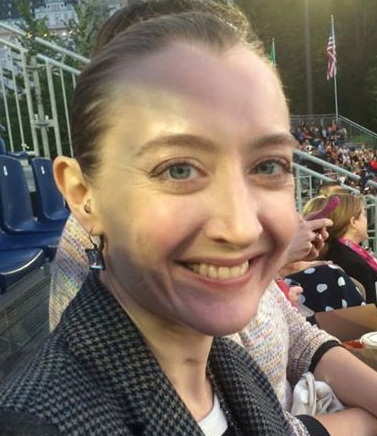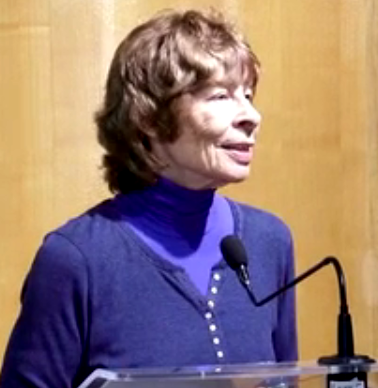 Women in Philosophy Conference: Student Talks
Women in Philosophy Conference: Student Talks
Monday November 2, 2015
Four graduate student women working in analytic philosophy — Bianca Crewe, Louise Daoust, Emily Sullivan, and Christine Susienka — will present their work in Room 5414 at the Graduate Center, CUNY, 365 5th Avenue. Details on the speakers and their talks, including abstracts, are below.
Bianca Crewe (University of British Columbia) “Beyond ‘Bad Data’: Data and Normativity in a Naturalized Scientific Framework”
Louise Daoust (University of Pennsylvania) “Constancy, Relationalism, and Color Science”
Emily Sullivan (Fordham University) “Inter-System Casual Explanations: Rethinking Renormalization Group”
Christine Susienka (Columbia University) “Invoking Rights and Communicating Wrongs”
ABSTRACTS:
Crewe, “Beyond ‘Bad Data’: Data and Normativity in a Naturalized Scientific Framework”
Optional Pre-talk Reading: “Uses of Value Judgments in Science” by Elizabeth Anderson
Within feminist science studies, it is generally acknowledged that value-free science is neither possible nor desirable. Following this acknowledgement, feminist naturalized empiricism suggests that it is possible to determine which values are justified in science by treating them like scientific hypotheses, subject to empirical testing and subsequently confirmed or disconfirmed by the relevant data. Thus, it is claimed that values have empirical content and can be evaluated as such. Furthermore, many scholars in this tradition argue that there is empirical evidence for commitments to gender and racial equality, and that therefore feminism can be vindicated from within a scientific framework. This account likewise claims to allow for the dismissal of racist, androcentric, or otherwise oppressive worldviews as disproved rather than as violating the objectivity of science. I contend that assumptions surrounding data and evidence are a central and unexplored problem for feminist naturalized empiricism, and that these assumptions precede and undergird the problem of adjudicating between political values in the sciences. Specifically, I argue that many feminist naturalized empiricists’ appeals to data as evidence for the justification of certain political commitments are premised on a specific, though unacknowledged, conception of data itself—namely, as neutral, objective, and outside of the workings of the power structures such theorists seek to expose. Ultimately, I argue that if our conception of the natural world is expanded to include political values, then the data used to justify our engagement with specific political commitments will also be value-laden. Overall, I hope to highlight both the insufficiency of a wholly naturalized empiricist evaluative framework in the sciences and the necessity of non-revisable political commitments designed to structure scientific endeavors and the treatment of data.
Daoust, “Constancy, Relationalism, and Color Science”
A longstanding puzzle in philosophy concerns how to fit colors into our scientificworldview. Explicitly or implicitly, color science has tended to rely upon an objectivist account of color according to which colors are mind-independent, physical properties. Color systems are modeled as striving to discount contextual factors, such as facts about illumination, in order to present or represent colors constantly: as invariant despite dramatic changes in proximal stimulation. Objectivism is motivated by an interest in explaining how perception guides action — an interest that has remained at the heart of color science. It also has a rich philosophical pedigree.
There is increasing acknowledgment among philosophers, however, that color vision isn’t perfectly constant: surfaces don’t look exactly the same under different viewing conditions, and this ought not necessarily be understood as a perceptual shortcoming. In response, there’s been a resurgence of interest in relationalism about color, the view that color is a property that exists between a perceiver and a physical surface. Instead of appealing to perceptual constancy to account for the similarity in how a particular surface appears across contexts, relationalists are motivated by the fact that surfaces appear differently under different viewing conditions. They embrace experiential variation, identifying color properties with the fleeting, particular relations that are manifest between perceivers and their environments, or with properties of these relations.
I argue that in embracing color as a maximally fine-grained phenomenon, these relational theories fail to acknowledge perceptual constancy as a feature of color vision at all. The result is less than innocuous: the action-guiding component of color is rendered merely parasitic on our account of color perception. Moreover, these views fail to speak to what makes color a subject worthy of scientific inquiry, a fact that helps to explain why relationalism remains peripheral to the methodological choices of color science. In conclusion, I appeal to phylogenetic history in proposing a novel kind of relationalism, one I argue results in better congruence between our metaphysical ambitions and the more practical interests of color science.
Sullivan, “Inter-System Casual Explanations: Rethinking Renormalization Group”
General explanations abstract away from irrelevant causal details. After abstraction we are still left with a causal explanation. For example, in explaining how water changes from a liquid to a gas we might abstract away from the spin of the microlevel particles. This leaves us with a more general explanation that points out macrolevel causes that bring about a phase change, such as the influence of heat.
However, when we want to explain why there are macrolevel similarities between disparate systems, then it is less clear if abstracting away from irrelevant causal details still leaves us with a causal explanation. Many have argued that Renormalization Group explanations of phase transitions that explain macrobheaviors of diverse systems are non-causal explanations. The challenge is that when we explain similarities between systems we are not only abstracting away from irrelevant causal details of the specific systems, but that we are ignoring causal details altogether. It seems that we are left with a non-
causal mathematical or structural explanation.
In this paper, I argue that inter-system explanations are in fact causal explanations. I take a close look at Renormalization Group explanations of phase transitions and argue contra Robert Batterman (2010) and Alexander Reutlinger (2014). that abstracting away from microlevel causal irrelevancies on the system specific level is not different in kind from how the causal irrelevancies are abstracted in inter-system explanations. This means that universal macrobehavior can in fact be explained through a macrolevel cause. I argue that this is so without doing away with our common sense intuitions about causality.
Susienka, “Invoking Rights and Communicating Wrongs”
What role does the invocation of rights and duties play in personal relationships? And how do the duties that correlate with rights fit into the broader landscape of relational responsibilities? The kinds of cases I have in mind are close relationships – those between friends, family members, or partners. As agents actively engaged in and committed to reciprocal personal relationships, we rely on the knowledge that our relatives care for us and will be responsive to reasons concerning our well-being or the well-being of our relationships. In this context, appeals to rights and duties seem to get the responsibilities generated by personal relationships descriptively wrong. Instead, they might be better characterized by commitments, shared values, or care for one another.
Nonetheless, I argue, rights do exist in these contexts, and they play what I refer to as a background role. Though it is not often fitting to invoke them in healthy relationships, they provide background conditions of trust and security that make more robust personal relationships possible. I proceed by identifying three reasons why rights claims are often unfitting, and I then develop a general positive account of when rights claims are fittingly invoked. I argue: (1) Rights claims are coercive—they make direct demands upon one’s relative rather than engage her in reasoning, and in doing so express distrust that appeals to one’s own well-being or that of the relationship will be motivating; (2)They invoke more general relationship types and fail to acknowledge the particularities of relationships; and (3),they fail to fully characterize the wrongings that occur between close relatives. These same features make it possible for rights to provide recourse when other means of response are insufficient. A further upshot of this approach is that it scales up to more general social relationships and ultimately can be used to characterize the role of human rights in our broader normative practices.
 Women in Philosophy Conference: Negotiations, Publishing, & Purpose
Women in Philosophy Conference: Negotiations, Publishing, & Purpose
Tuesday November 3, 2015
Building on the success of last year’s panel, SWIP-Analytic will again host an event on women in philosophy in Room 5414 at the Graduate Center, CUNY, 365 5th Avenue.
Tuesday Nov 3 Schedule
10:30 – 12:00: Guided Q&A Roundtable on Women in Philosophy with Jessica Gordon-Roth, Miriam Schoenfield, and Adriana Renero
12:00 – 1:00: Lunch
1:00 – 2:30: Presentation on Imposter Syndrome with Alice Mangan
2:30 – 4:00: Presentation on Negotiations with Kim Keating
4:00: Tea
All attendees are invited to join us to continue conversations over 4:15 afternoon tea at Measure (400 5th Avenue at 36th) following the presentation. RSVP for tea is required by November 1st. RSVP here.
Jessica Gordon-Roth, Participant in Rountable on Women in Philosophy
Jessica Gordon-Roth, PhD, received her doctorate from the University of Illinois at Chicago and is an Assistant Professor of Philosophy at Lehman College. Her field of interest is the history of early modern philosophy, especially Locke. Currently her research is focused on the ways in which different conceptions of “substance” and “mode” inform the early modern debate over personal identity. Gordon-Roth’s “Catharine Trotter Cockburn’s Defense of Locke” was recently published in The Monist, and her joint work with Nancy Kendrick, “Including Early Modern Women Writers in Survey Courses: A Call to Action”, appeared in Metaphilosophy this year. She will teach a course on Locke at the Graduate Center this spring.
Kimberly Keating, Presentation on Negotiations.
Kimberly Keating, MBA, CEO of Keating Advisors, received her M.B.A. from the Harvard Graduate School of Business Administration and a B.B.A. in Finance from Southern Methodist University. Keating is currently a board member of Leanin.org Foundation and a contributor to Sheryl Sandberg’s best-selling book, Lean In For Graduates, where she dispenses advice on how negotiate a fair and decent salary for your first job. Through Keating Advisors, she gives speeches and workshops to help professionals with proven negotiation tactics.
Alice Mangan, Presentation on the Imposter Syndrome.
Alice Mangan, M.Phil., M.S., Ph.D., recently completed her doctorate in Clinical Psychology at The Graduate Center, CUNY. Mangan works clinically with children, adolescents and young adults in individual, group and couples treatment, and has a private practice as a learning specialist, parent and educational consultant in New York City. Mangan’s clinical and research interests span the intersections of learning disability, parent and child development, and the effects of learning disabilities on the psychological development of the child, parent and family system. She is a former member of the graduate faculty at Bank Street College of Education. Mangan presented to SWIP-Analytic November 2014.
Adriana Renero, Participant in Rountable on Women in Philosophy
Adriana Renero, MA, is a doctoral candidate at the CUNY Graduate Center and holds an MA from Universidad Nacional Autónoma de México (UNAM). Her areas of specialization are philosophy of mind and aesthetics, and she has additional research interests in epistemology, metaphysics, and cognitive science. Renero has presented her work at Harvard University, UNAM, and Columbia University. Her “Consciousness and Mental Qualities for Auditory Sensations” was published in the Journal of Consciousness Studies in 2014.
Miriam Schoenfield, Participant in Rountable on Women in Philosophy
Miriam Schoenfield, PhD, received her doctorate from MIT. She is Assistant Professor in the Department of Philosophy at The University of Texas at Austin and currently Bersoff Fellow at New York University. Her primary research interests are in epistemology and ethics and normativity more broadly. Schoenfield’s “Chilling Out on Epistemic Rationality: A Defense of Imprecise Credences (and other imprecise doxastic attitudes)” appeared in Philosophical Studies in 2012 and her “Bridging Rationality and Accuracy” is forthcoming in The Journal of Philosophy.
_________________________________________________________________________________________
 Monday October 5, 2015
Monday October 5, 2015
5:00 – 7:00 PM
Professor Michele Moody-Adams (Columbia) will present “Moral Progress and Human Agency” at the CUNY Graduate Center, Room 9206, Monday, October 5, 2015.
Abstract: I argue that the idea of moral progress is a necessary presupposition of action for beings like us. We must believe that moral progress is possible, and that it might have been realized in human experience at some point in history, if we are to be confident that continued human action can have any morally constructive point. I discuss the implications of this truth for moral psychology. But I also argue that once we understand the complex nature—and the complicated social sources—of moral progress, we will appreciate that we cannot find a single principle, or set of principles, to reliably guide attempts to make the world “a better place.” Yet while the idea of moral progress cannot ultimately yield such principles of action, it can serve, as I’ll show, as a plausible and constructive principle of historical interpretation.
_________________________________________________________________________________________
Monday September 14, 2015
5:00 – 7:00 PM
Professor Susanna Siegel (Harvard) presented “Salience Norms” at the NYU Philosophy Department Sixth Floor Lounge on Monday, September 14.
Abstract: We evaluate newspapers according to two dimensions: whether their stories are well-researched and accurate (did the reporter check their facts?), and which stories they choose to print in the first place (are the stories relevant to the public? newsworthy? important?). Could an analogous distinction apply to the representational states in an individual’s mind? We use epistemic norms to evaluate beliefs according to whether they are true and well-founded. But discussions of which thoughts should populate the mind in the first place are far less common in epistemology. I discuss whether there are norms of salience that apply to the mind, and if so, what kinds of norms these might be.
SWIP-Analytic organizers Marilynn Johnson and Kate Pendoley presented a talk entitled “Women in Analytic Philosophy” at the Hypatia conference, Exploring Collaborative Contestations, at Villanova University, May 28-30, 2015. The event was be held in conjunction with the APA Committee on the Status of Women Diversity Conference. Thanks to the New York Institute of Philosophy at NYU and the Provost at the CUNY Graduate Center for additional funding in support of our travels and to Hypatia Editor Sally Shultz for inviting SWIP-Analytic to present at the conference.
Poster at Hypatia Conference announcing Keynote Speakers and Invited Panels, including SWIP-Analytic, May 28, 2015. (Photo: Marilynn Johnson)
Marilynn Johnson and Kate Pendoley presented “Women in Analytic Philosophy” at the Hypatia Conference on May 30, 2015.
_________________________________________________________________________________________
 Monday, April 20, 2015
Monday, April 20, 2015
1:00 – 3:00 PM
Rebecca Traynor, winner of the SWIP-Analytic 2015 Graduate Student Essay Prize, presented “Accurate Representation is Accurate Distortion” at SWIP-Analytic Monday, April 20, 2015 in room 202 in the NYU Philosophy Department. We encouraged attendees to read the winning paper in advance of the presentation.
ABSTRACT: Picasso’s ‘Woman Ironing’ captures the drudgery of ironing in virtue of depicting a woman so grey and emaciated she fails to correspond to the visual appearance of any actual woman. The painting distorts visual appearance in order to accurately represent a feature of the world—drudgery—for which we have no independent sense. I hypothesize that perception can similarly distort but accurately represent the external world. Orthodox accounts of representation split perceiving subjects from perceived objects; they take mental representation to represent the external world as it is in itself such that the former is transparent to the latter. But this means perceptual content is often in error. For example, researchers found that participants standing at the base of a hill while carrying a heavy backpack regularly overestimate steepness (Proffitt, et al. 1995). I argue that exaggerating steepness is accurate insofar as it corresponds to a relational feature of the world—arduousness—for which we have no independent sense. I argue that representational content admits of accurate distortions because accuracy is a matter of capturing relational facts about the world.
I argue artistic and mental representations admit of accurate distortions. However, distortions in artistic representation differ from those in mental representation because they aim at aesthetic goals. This means that the two cases admit of different functions. And it means that instances of artistic distortions are frequently—though not always—a result of conscious deliberation. I propose that when artists distort the external world, the choices they make exploit and thereby highlight cases of accurate distortion in mental representation. I hypothesize that cases of accurate distortion in art are parasitic on cases of accurate distortion in mental representation and that artistic skill is correlated with the ability to manipulate perceptual distortions.
_______________________________________________________________________________________________
 Tuesday, March 24, 2015, 5:00 – 7:00 PM
Tuesday, March 24, 2015, 5:00 – 7:00 PM
Professor Laura Franklin-Hall (NYU) presented “Why are some kinds historical and others not?” in Room 5307 at the Graduate Center, CUNY, 365 5th Avenue, New York City.
ABSTRACT: This talk explores why scientists sometimes classify entities by their origins, and other times based exclusively on their non-historical or ‘synchronic’ properties. After reviewing examples of these two approaches, I formulate a principle designed to both describe and explain this aspect of our scientific classificatory practice. According to this proposal, a domain is apt for historical classifications just when the probability of the independent emergence of similar entities (PIES) in that domain is very low. In addition to rationalizing this principle and showing its ability to correctly account for classification practices across the natural and social sciences, I will consider the nature of the probabilities that are at its core.
_____________________________________________________________________________________________
 Monday, March 2, 2015, 5:00 – 7:00 PM
Monday, March 2, 2015, 5:00 – 7:00 PM
Professor Karen Lewis (Columbia) presented “Reverse Sobel Sequences in Static Semantics” in Room 302, NYU Philosophy Department, 5 Washington Place, New York City.
ABSTRACT: Sobel Sequences are consistent sequences of counterfactuals like the following:
(1a) If Sophie had gone to the parade, she would have seen Pedro dance.
(1b) But of course, if Sophie had gone to the parade and been stuck behind someone tall, she wouldn’t have seen Pedro dance.
But reverse the sequence, and it does not sound so good at all. This observation – that order makes a difference to the consistency of the sequence – motivated Kai von Fintel and Thony Gillies to abandon the classic Lewis-Stalnaker semantics and adopt a dynamic semantic account of counterfactual conditionals. Subsequently, Sarah Moss defended the classic Lewis-Stalnaker semantics against the charge that it need be abandoned because of Reverse Sobel Sequences, arguing for a pragmatic account of the infelicity of the sequences. I argue that ultimately both the dynamic semantic account and Moss’s account are untenable, but that seeing what is good about each account points the way to the right positive story. Finally, I defend a positive view that attributes the effect of counterfactuals on the context to pragmatics, but treats the effect of the context on counterfactuals as semantic.
If you wanted to prepare for the topic in advance, the paper by Sarah Moss on Sobel sequences is available online here.
_____________________________________________________________________________________________
 Monday, November 17th, 2014, 1-3 PM
Monday, November 17th, 2014, 1-3 PM
SWIP-Analytic’s session, “Women in Philosophy: Publishing, Jobs, & Fitting In” began with an informal roundtable featuring Jessica Gordon-Roth (Lehman) and SWIP-Analytic Organizers Lisa Miracchi (NYU/Penn) and Katie Tullmann (CUNY). They discussed work habits, publishing, and job searches, among other things. Marilynn Johnson (CUNY) moderated. This was followed by a presentation by Predoctoral Fellow in Clinical Psychology Alice Mangan of the Wellness Center on Imposter Syndrome.
Roundtable w/Gordon-Roth, Miracchi, Tullmann: 1:00 – 2:10
Imposter Syndrome Session w/Mangan: 2:15 – 3:00
Afternoon Tea at Measure (RSVP here): 3:15 – 4:15
Gordon-Roth is Assistant Professor of Philosophy at Lehman College, CUNY. She received her PhD in 2012 from the University of Illinois at Chicago. Her “Catharine Trotter Cockburn’s Defense of Locke” is forthcoming in The Monist (2015).
Miracchi is currently a Bersoff Assistant Professor/Faculty Fellow of Philosophy at NYU and begins her tenure-track position at Penn Fall 2015. She received her PhD from Rutgers in 2014. Her “Competence to Know” was published in Philosophical Studies (2014).
Tullmann is currently on the job market as a PhD Candidate in Philosophy at the Graduate Center, CUNY with an expected graduation date of Spring 2015. She has articles in preparation for Mind (with Wesley Buckwalter) and Inquiry.
All attendees were invited to join us to continue conversations over 3:15 afternoon tea at Measure (400 5th Avenue at 36th) following the presentation. RSVP for tea was required by November 10th.
_____________________________________________________________________________________________
 Monday, October 13th, 2014, 5-7 PM
Monday, October 13th, 2014, 5-7 PM
Professor Deirdre Wilson (UCL & CSMN, Oslo) presented at SWIP-Analytic Monday, October 13th from 5:00 – 7:00 at New York University, in the second floor seminar room 202, 5 Washington Place. Her talk was entitled “Irony, hyperbole, jokes and banter: What should a theory of verbal irony aim to explain?“.
ABSTRACT: In the last ten or fifteen years, following the collapse of the classical and Gricean treatments of verbal irony as a matter of saying one thing and meaning the opposite, a range of disparate phenomena including hyperbole, banter, understatement, jokes and rhetorical questions have been commonly treated as forms of verbal irony in the literature on irony comprehension. Ray Gibbs (2000/2007: 342), whose pioneering experimental studies of rhetoric and poetics have been deservedly influential, sees this as “an important challenge for cognitive science theories of irony. Is it necessarily the case that a single theory will account for the multiple forms and functions of irony in ordinary speech?” In his view,
Irony is not a single category of figurative language, but includes a variety of types, each of which is motivated by slightly different cognitive, linguistic, and social factors, and conveys somewhat different pragmatic meanings.
After illustrating how this broadened notion of irony is being used in current experimental studies and outlining some distinctive features of typical cases of verbal irony, I will argue that hyperbole, banter, understatement, jokes and rhetorical questions are not inherently ironical, and routinely including them in the data for experimental studies of irony comprehension distorts the results and obscures our understanding of irony.
Click here to download pdf of “Irony in Talk Among Friends” (Gibbs 2000/2007)
_____________________________________________________________________________________________
 Monday, September 8th, 2014, 5-7 PM
Monday, September 8th, 2014, 5-7 PM
Professor Jessica Moss (NYU) presented “Dual Systems in 400 BC: Plato and the Origins of Contemporary Psychology” at SWIP-Analytic Monday, September 8th from 5:00-7:00 PM at the Graduate Center, CUNY.
ABSTRACT: Proponents of contemporary Dual Systems psychology – the view that we have in some sense two minds, one responsible for automatic, associative, intuitive processing, and the other for controlled, inferential, deliberative processing – have sometimes recognized that there are ancient roots to their view. I will argue that we should in fact credit Plato with anticipating this contemporary view in striking, almost comprehensive detail, and also that the contemporary view both illuminates and vindicates Plato’s much-misunderstood notions of parts of the soul and of rationality.
Listen to Jessica Moss interview “Plato and Aristotle on Weakness of Will” on Philosophy Bites
Fall Kickoff Mixer raffle prize generously provided for SWIP-Analytic by Oxford University Press. Vivian Feldblyum was the lucky winner of Emma Borg’s Minimal Semantics and Ruth Millikan’s Language: A Biological Model.
Vivian Feldblyum (McGill) treated us to a performance of her philosophy songs, including the Deductive Logic Love Song, shown here, at the reception and Fall Kickoff Mixer on Monday, September 8th, at the CUNY Graduate Center.








